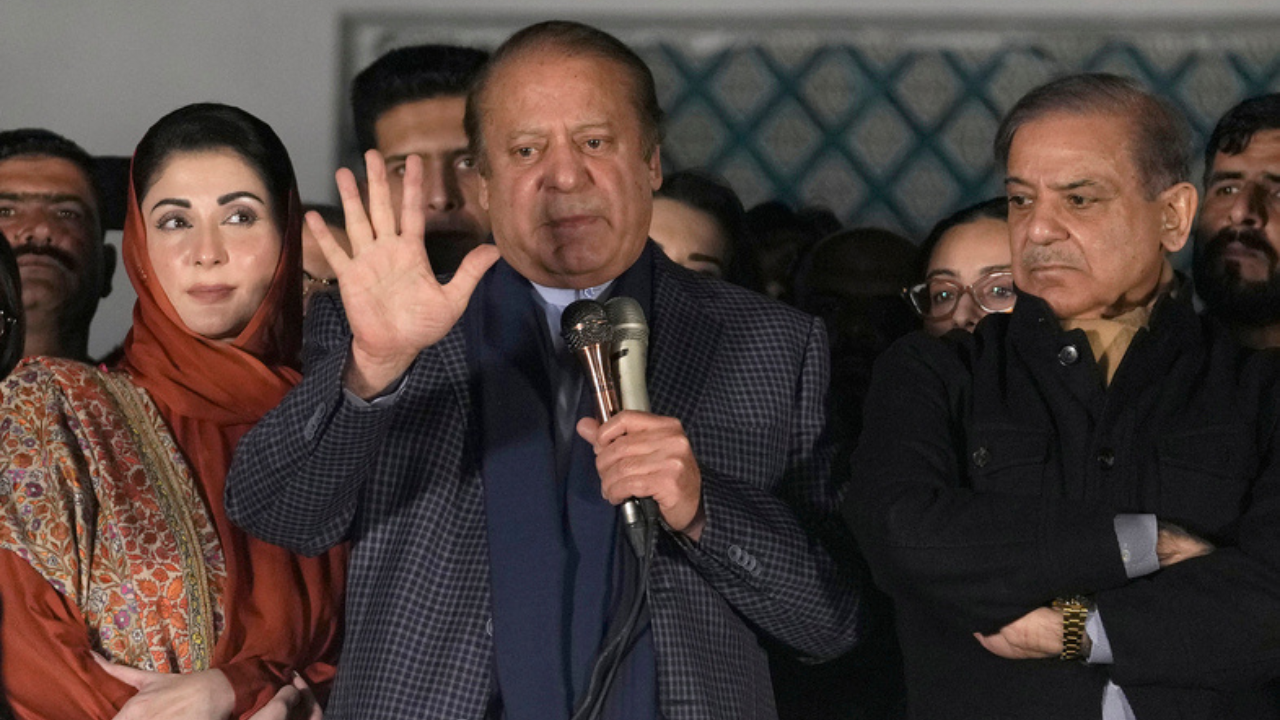It’s all in the family: With army’s backing, Sharifs win Pakistan’s game of thrones

NEW DELHI: Shehbaz Sharif is set to begin a second term as Pakistan‘s prime minister after it was revealed on Wednesday that he had secured the blessings of his older brother and three-time PM Nawaz Sharif to become the leader of the coalesced house.
It is widely expected that Nawaz Sharif, 74, will be the major guiding hand during his younger brother’s next stint.Nawaz Sharif’s daughter, Maryam Nawaz, will be the coalition’s candidate for the slot of Punjab chief minister.
Despite the twist and turns of the controversy-marred elections, it seems the Pakistan army — which had heavily backed Nawaz Sharif’s return to Pakistan politics — has once again come out on top.
Independent candidates backed by former PM Imran Khan won over 100 seats, but it is unlikely that the jailed leader or his embattled party (Pakistan Tehreek-e-Insaf) will have any say in the next government.
Sharifs‘ Pakistan Muslim League-Nawaz (PML-N) party controls only 80 seats in the 264-seat parliament but has been promised support by six other parties for a majority.
Shehbaz Sharif, 72, was named by his party and coalition allies to head the nuclear-armed nation despite his elder brother winning a seat in the assembly and being favourite to be sworn in for a fourth term.
Maryam said in a post on X that her father did not want to run a minority coalition government having had clear majorities in his three previous stints as premier.
In numbers
As per the Election Commission of Pakistan’s tally, the total number of general seats won by the six parties which announced their plans to form a coalition led by Shehbaz Sharif — PML-N, PPP, MQM-P, PML-Q, IPP and BAP — comes to 152. The coalition will easily achieve the minimum required number of 169 to form the government at the Centre after the addition of 60 women and 10 minority seats in their tally.
However, it is yet to be seen if these parties will be able to get to the next magic number of 224, which is required to obtain the elusive two-thirds majority in a 336-member National Assembly.
Since 101 independents, including 92 of Imran Khan’s PTI-backed independents, have emerged victorious in the February 8 elections, the allocation of reserved seats depends upon the decision taken by these independents to either join a party or remain independent.
Shehbaz’s crucial role
The younger Sharif played a pivotal role in maintaining cohesion among a coalition of diverse parties for 16 months following the parliamentary ousting of former premier and rival Imran Khan in 2022. Additionally, he was instrumental in securing a crucial International Monetary Fund (IMF) agreement in 2023.
Shehbaz assumed the position of Prime Minister as the PML-N set aside differences with the influential military in opposition to their shared adversary, Khan, who clashed with top generals over policy discrepancies. During this period, Nawaz Sharif resided in self-imposed exile in London and was ineligible for public office.
Before his tenure as PM, the younger Sharif was recognized more for his adept administrative skills than his political acumen, having served thrice as CM in Punjab, the nation’s largest province. However, upon assuming the role of PM, he swiftly adopted the role of mediator between coalition parties often in conflict over significant policies.
Shehbaz Sharif’s most notable achievement during his brief tenure was securing an IMF bailout as Pakistan teetered on the edge of a debt default. This agreement was finalized after Sharif personally engaged with IMF chief Kristalina Georgieva last June.
Nonetheless, under his administration, inflation soared to 38%, accompanied by a significant devaluation of the rupee – primarily attributed to the structural reforms mandated by the IMF program to stabilize the economy.
He attributes the economic downturn to Khan’s administration, alleging that they reneged on an agreement with the IMF just before his ousting. Sharif contends that his government was compelled to implement a series of reforms and eliminate subsidies, leading to a surge in inflation.
Key challenges
Pakistan continues to be enmeshed in the economic crisis with inflation remaining high, hovering around 30%, and economic growth slowing to around 2%.
But Sharif’s main role will be to maintain ties with the military, which has directly or indirectly dominated Pakistan since independence.
Unlike his elder brother, who has had a rocky relationship with the military in all his three terms, the younger Sharif is considered more acceptable and compliant by the generals, analysts say.
For several years, the military has denied it interferes in politics. But it has in the past directly intervened to topple civilian governments three times, and no prime minister has finished a full five-year term since independence in 1947.
(With inputs from agencies)
